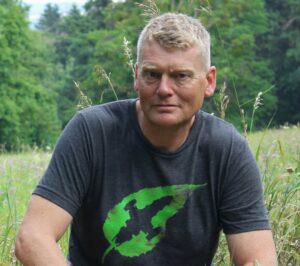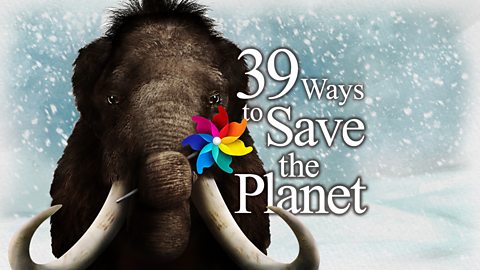Disclaimer: Some of the answers provided by the interviewee have been slightly altered or abridged to be succinct in a written format.
In January 2021, I had the pleasure of chatting with Tom Heap, BBC News’ Rural Affairs Correspondent and a regular presenter of investigations on Countryfile, to discuss his new podcast series, ‘39 Ways to Save the Planet’.
We talked about some of the inspiring stories of innovation and progress he discovered while researching climate change solutions happening right now which we rarely get to hear about, bringing us some hope about our predicament as well as being an enjoyable listen.
Please introduce yourself and the podcast series.
I’m Tom Heap, I’ve been a broadcaster for 25-30 years now, with the last two-thirds of that very much specialising in science, the environment and rural affairs. Over that time, obviously, the climate change story has been growing in importance, volume and seriousness. I’ve been struck by how it seems to me that there are a lot of things being done to combat the problem, and there are a lot of really interesting innovations, break-throughs and passionate people which we don’t hear quite enough about, so the narrative becomes a little bit one-sided. We need to also hear about the narrative of redemption and what is actually happening by way of people beginning to turn this problem around. This is interesting, it’s empowering, and it gives people the critical belief, which I believe to be true, that this is not hopeless – we can do this.
The series, which aims to bring light to these more positive developments, is called 39 Ways to Save the Planet and will be going out across this year on Radio 4 and BBC Sounds.
What motivated you to make the series?
It’s partly what I just mentioned about having been aware that I felt in the environment we were covering the problem fairly well, so what inspired me to do this was two things.
One was this feeling that we were under-playing our successes in terms of tackling climate change and focusing on the defeats. Now, it’s not that the defeats aren’t real, it’s not that the problems aren’t there, I’m not saying that for one moment, but if you want to galvanise people into engaging with something, then it’s no good just to focus on what’s going wrong, you need to tell them what’s going right as well. A good example of that is if you asked anyone in the street about the climate impact of our electricity in Britain, they’d probably say ‘it’s terrible, it’s getting worse, blah blah blah‘, but in fact, the amount of carbon in every kilowatt of electricity we generate in the UK has gone down by more than half in the last ten years; it’s been an extraordinary success story – our efforts to decarbonise our electricity in this country. This is an example of how I felt the successes were being under-covered.
The other thing is that in doing my research amongst the people who really know about this stuff – the Intergovernmental Panel on Climate Change (IPCC), the Climate Change Committee and the Royal Geographical Society – when you ask how much money it’ll take to cut carbon in the way we need to stop going over 1.5 degrees per the 2015 Paris Agreement, they all say something in the region of between 0% of GDP to 1.5% of GDP, and even the UK Treasury recently did a pretty similar analysis. Well, if you think about it, a penny in the pound to save the world sounds like a banging deal to me. If you begin to improve the environment, you’ll actually save money on things like flood damage, air-pollution-caused health defects, stuff like that. So, this idea that’s widely put around that decarbonising is going to cost a fortune and we’re all going to go back to the stone age is just rubbish. It can be done, there are solutions out there, and it ain’t going to break the bank. If there’s one message I want to come out of this series, it’s that it’s doable.
So, are you feeling optimistic about the future of scientific advancements in this field?
Yes, I’m definitely feeling optimistic, not least because thankfully the idea I had when we started the series has been backed up by the people I’ve met while making it who give me a lot of hope – they’re very inspiring. I should say, though, it’s not all about tech or science or inventors; we’re talking about teachers making a difference, lawyers making a difference, businesspeople making a difference. I was very keen to get across this idea that this series isn’t just going to be a tech-fest. I mean, tech is really important, but it’s those things plus farmers making a difference, land managers making a difference, marine biologists making a difference, and so there really is a role for everybody.
It can be a criticism from some quarters that I’m sort of letting people off the hook, letting the audience off the hook, because one thing this series is not is telling you ‘here’s what you should be doing in your own life‘ – it’s not that. I make no apology for that in the sense that most of the big levers are not actually in the hands of individual behaviour, and the track record for trying to make people change their behaviour is woefully poor, so in a sense, why carry on banging your head against that spike? My feeling is that given that I said that it’s doable, it is a question of us supporting these things through what we buy, how we vote, how we invest, and yes, some decisions in our own lives. The solutions are out there, now it’s about will – it’s about politics, business, and public will to back these ideas.
You mentioned all of the various kinds of people in industry and agriculture who can make a difference in this respect. What do you think needs to be done to convince people in those fields who might be sceptical about the viability and effectiveness of switching to more sustainable methods?
I hope that this series is part of what convinces them that it can be done. You look around and you can see that the wind is blowing, and if I’m a business that doesn’t want to be blown over by this, I need to set my sails to enhance it and reap it. I have to say, a lot of this is happening already, certainly in business and politics. In politics in this country, all governments in recent years, although I will argue they haven’t gone far enough or fast enough, have got it. This administration, whatever your feelings about it, are surprising a lot of people in their apparent commitment to things to do with climate change and green recovery. The recent announcements from the incoming President of the U.S., an announcement in China committing to a zero-carbon target in 2060, the EU announcing the biggest ever green recovery package in the wake of Covid – it feels like the political levers are coming in our direction. I feel in the past that politicians felt there were votes to be lost in this area because people thought it was all gloomy and negative and preachy and they weren’t sure if they believed it anyway. I think that it’s a much easier thing for politicians to sell now.
In business, it’s a little more difficult to judge, but I’ve heard from people in the industry that the penny has dropped in the business world. Businesses are invested in putting their own houses in order in terms of climate change, and they see it as a business opportunity. They think auditors and accountants will be required to be looking at this stuff to understand the carbon balance of companies, to understand how companies can become closer to carbon neutrality, closer to net-zero.
Focusing back in on the podcast – controversial question, but do you have a favourite episode so far?
All of them spark my curiosity and interest in different ways.
I love the ‘Wood for Good’ one. He had a great voice which always helps; he had a rich voice. That’s the equivalent of being good-looking on the radio. But more importantly, it was one of those penny-drop things. When you think of wood, that is carbon capture and storage. It pulled it out of the atmosphere, it is being stored there, and wood was used [in this building]instead of using concrete or steel. The idea that we could be building so much more with wood, and the fact that it’s a kind of reinvention of something we used to do. It’s partly prompted by this new material – cross-laminated timber – which he was talking about which, in itself, is a fairly simple idea that is making these things possible. I had a lot of good responses to that, so I like that one.
I love the ‘Educating and Empowering Girls’ one because a lot of climate change solutions have collateral benefits, but surely none more so than the education of women and girls, for there is obviously a huge upside for their own lives and their own futures as well as the whole planet in general.
I find it so interesting how wide-ranging the topics have been so far…
I’m delighted to hear you say that. That’s very much what we wanted to achieve – for people to listen in not really knowing what kind of thing they were going to come to this time. I think that’s really important, and it reflects the fact that solving this problem is not just a story for engineers.
Finally, how would you promote this podcast as a good thing for student listeners specifically?
If you’re a young person, this is relevant to your future. Full stop. If you’re interested in the next 60 years of life on Earth, you should be engaging with this. I hope it’ll be fun; I mean one of the things that slightly annoys me about programmes to do with the environment is that people assume they should have some kind of message, some sort of instruction. Well, primarily, I want it to be an enjoyable listen – I want it to be an interesting, engaging, and fun 13 minutes where you come away from it saying ‘well, there were a few things I didn’t know, I liked that‘. If it ends like that, I’m happy.
In terms of students, I think given what you’ve just said about the breadth of topics, there are surely things here that are relevant to politics students, that are relevant to business students, that are relevant to engineers, that are relevant to oceanographers, that are relevant to people doing teacher training. I cannot think of a single discipline that it’s not relevant to. I mean, even if you’re studying Ancient Greek, there are probably lessons that one could learn from the politics of that time that would be relevant to the climate crisis of today to do with existential threats and how we deal with fear and societal change.
That sort of brings me back, once again, to this thing of what you can do. I’ve made it clear that I don’t particularly want this programme to be overtly saying ‘you should be doing this, that or the other‘, but there are people in all walks of life seeing what they can do professionally, either as part of their focus or their complete focus. There are things you can be thinking about as to how you could make this stuff more of a priority in your business, in your school, on your farm, in your marketing company, whatever it is that you do. I think the undercurrent is that this is something for all of us.

The first ten 15-minute episodes of the podcast are available to hear for free via BBC Sounds and Spotify, as well as live on BBC Radio 4. More episodes will be released later on in the year.




